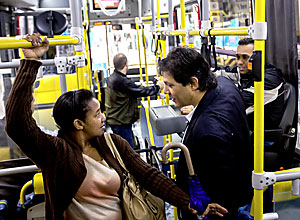Latest Photo Galleries
Brazilian Markets
12h03 Bovespa |
-0,14% | 129.028 |
16h43 Gold |
0,00% | 117 |
12h17 Dollar |
+0,39% | 5,0873 |
16h30 Euro |
+0,49% | 2,65250 |
ADVERTISING
São Paulo Mayor Argues for Reduction in Car Use at Folha Event
10/10/2013 - 08h42
Advertising
JULIANA VITULSKIS
DHIEGO MAIA
REPORT FOR FOLHA
The Mayor of São Paulo, Fernando Haddad (PT), on Wednesday identified the irresponsible use of the car, and its supremacy to the detriment of other means of transport, as the greatest errors in public policy regarding transport in the city. Haddad made his criticisms on the first day of Folha 's Urban Mobility Forum.
For Haddad, the effect of all this has been to privatize the surface of the city, with a means of transport he defined as 'stodgy.' "All investment in transport has directly benefited the car," he said. "The Marginal Tietê and the Marginal Pinheiros [sections of the SP-15 highway] are proof of this."
| Apu Gomes/Folhapress |
 |
| Mayor of Sao Paulo, Fernando Haddad, going to work by bus |
The Mayor recognized that São Paulo has a considerable network of roads, but that even so, there is not sufficient space for everyone to run a car. Nonetheless, he argued that 'the problem is not that everyone has a car. The problem is with the way they use it.'
One of the solutions implemented by Haddad has been the expansion of bus lanes in the city. This policy was implemented by his administration following the wave of protests in June which succeeded in reversing a proposed fare hike on public transport. Today São Paulo has 224.6km (140 miles) of exclusive bus lanes.
Haddad made favorable mention to the transport system in Curitiba, state capital of Paraná, which in the 1970s implemented a BRT (Bus Rapid Transit) system, a network of exclusive bus lanes and articulated - 'bendy' - buses. The system has been a great success and revolutionized day to day travel in the city.
"We've exported this technology to other cities all around the world, but we haven't managed to export it to other cities in Brazil," he said.
For the ex-mayor of Curitiba and the ex-governor of Paraná, Jaime Lerner, "the car will be the cigarette of the future. While it may be acceptable to use the car for longer trips and for leisure purposes, we should increasingly prioritize public transport when it comes to daily use."
According to the State Secretary for Metropolitan Transport, Jurandir Fernandes, "we also need to stimulate people to cycle and to walk more, to promote new routes and habits beyond those to which they are already accustomed, and encourage car sharing."
Translated by TOM GATEHOUSE



